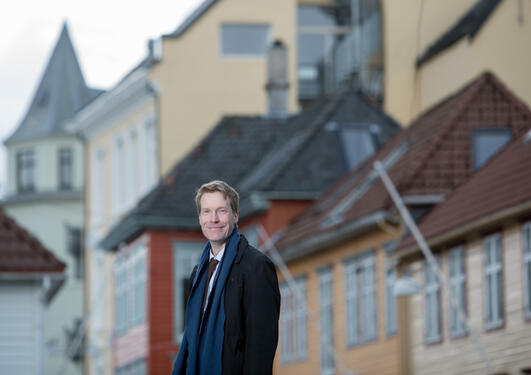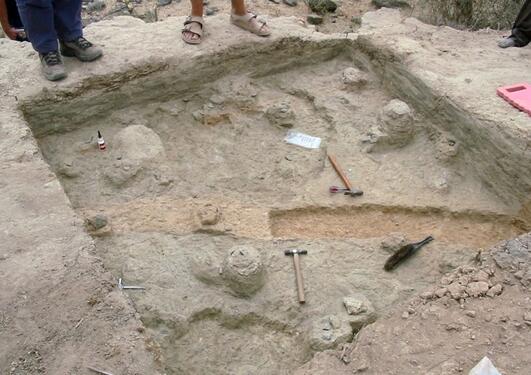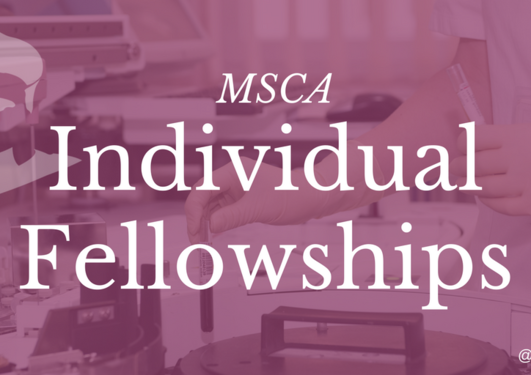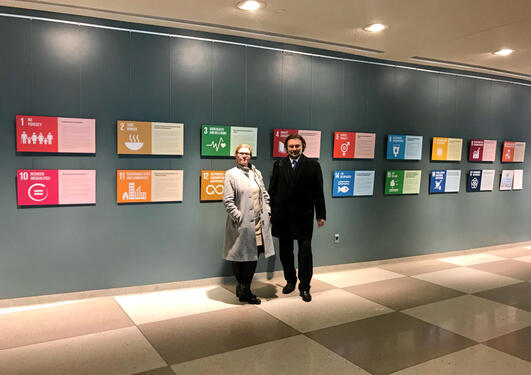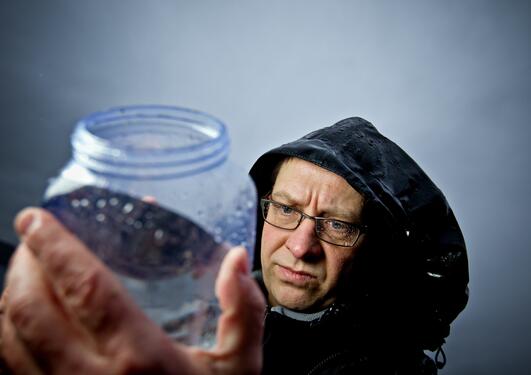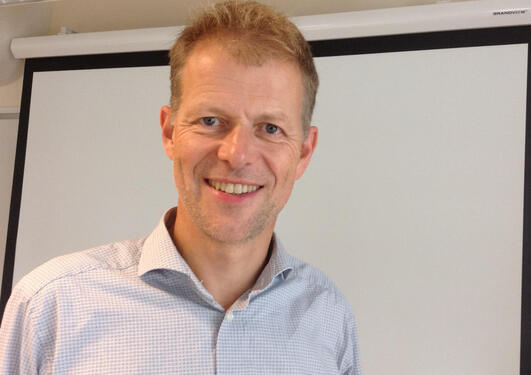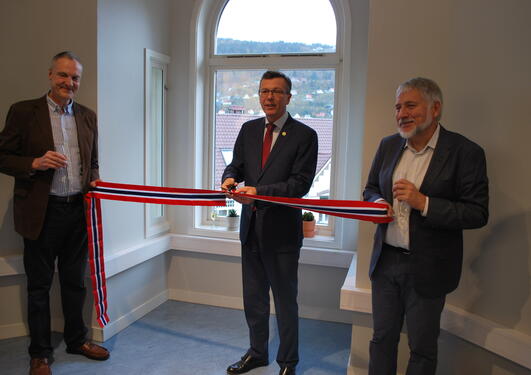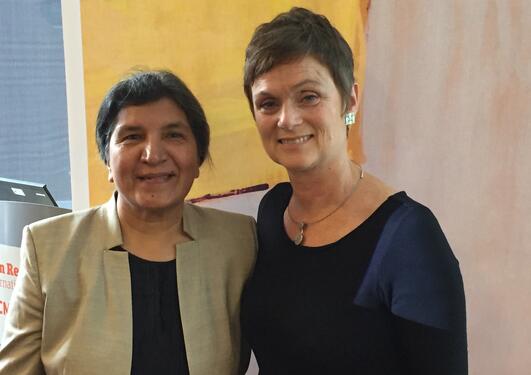News archive for News
For many years, the University of Bergen has focused on historical and archaeological research in the Middle East and in Syria in particular. How is the research going forward despite the difficult situation in the region?
Climate researcher Hans Christian Steen-Larsen has for many years explored some of the most extreme environments on Earth, in his search to improve our climate models. If he succeeds with his new ERC-project, it will have great impact on todays climate research.
Groundbreaking research puts human evolution in a new perspective as significant archaeological findings reveals sign of modern human behavior 300 000 years ago.
Cleaners who have regularly used cleaning sprays over 20 years were found to have reduced lung function equivalent to smoking 20 cigarettes a day over the same period, a UiB-study shows.
How do people live in a place where the question is not if the disaster will happen, but when?
Social anthropologist Edvard Hviding is one of three University of Bergen researchers to receive five years of major funding from the prestigious Toppforsk programme, awarded by the Research Council of Norway, for his project Mare Nullius.
Thanks to EU funding, the Digital Culture, Archaeology, Philosophy and Theory of Science researchs groups will welcome new international researchers to their team.
These groups at the Faculty of Humanities received five out of seven Marie Curie grants awarded to UiB.
Norwegian Prime Minister Erna Solberg has established an international high-level panel for a sustainable ocean economy. The University of Bergen looks forward to being part of this marine effort and contribute with scientific advice.
UiB's new Vice-Rector for Global Relations, Annelin Eriksen, chose New York as the destination for her first international trip after being appointed. In New York she met with diplomats and United Nations officials.
Interview with Dr Kenneth Hugdahl on his research into auditory hallucination, why meaningful scientific advancement takes time and how the European Research Council (ERC) is integral in making it happen.
New discoveries from the University of Bergen can knock a hundred years old hypothesis on the evolution of the nervous system off its perch. The results are published in Nature.
A glowing interest in the climate challenges and the need for a transformation of society to minimize these changes made Kårstein Måseide apply for the job as research coordinator at CET. He wants to encourage broad, interdisciplinary climate research.
Prime Minister Erna Solberg is one of the key note speakers at the Sustainable Development Goals conference at the University of Bergen, 8-9 February, 2018.
Controversial electrotherapy has been replaced with small electrical impulses to the brain. This can help patients with depression, stroke and brain tumours.
She’s both a groundbreaking computer scientist and an excellent teacher; and now she’s awarded the Teaching Prize at the Faculty of Mathematics and Natural Sciences.
Professor Marit Skivenes has received 10 million Norwegian kroner from the Research Council of Norway for her research on child care. The new grant is part of her new research centre, which will bring together world-class researchers in the field of law, child protection and children's rights.
On Monday 21 August, the fourth Bergen Exchanges conference opened with a special focus on legislation as a catalyst for social change regarding gender and sexuality.
Pages
- December 2025 (6)
- November 2025 (2)
- October 2025 (5)
- September 2025 (5)
- August 2025 (4)
- July 2025 (5)
- June 2025 (10)
- May 2025 (2)
- April 2025 (8)
- March 2025 (6)
- February 2025 (9)
- January 2025 (6)
- December 2024 (6)
- November 2024 (4)
- October 2024 (5)
- September 2024 (9)
- August 2024 (3)
- July 2024 (2)
- June 2024 (9)
- May 2024 (3)
- April 2024 (7)
- March 2024 (8)
- February 2024 (7)
- January 2024 (6)
- December 2023 (9)
- November 2023 (11)
- October 2023 (10)
- September 2023 (9)
- August 2023 (12)
- July 2023 (1)
- June 2023 (9)
- May 2023 (13)
- April 2023 (6)
- March 2023 (12)
- February 2023 (10)
- January 2023 (4)
- December 2022 (1)
- November 2022 (7)
- October 2022 (5)
- September 2022 (6)
- August 2022 (2)
- July 2022 (1)
- June 2022 (7)
- May 2022 (6)
- April 2022 (7)
- March 2022 (8)
- February 2022 (11)
- January 2022 (5)
- December 2021 (5)
- November 2021 (3)
- October 2021 (5)
- September 2021 (2)
- August 2021 (6)
- July 2021 (1)
- June 2021 (15)
- May 2021 (11)
- April 2021 (6)
- March 2021 (9)
- February 2021 (7)
- January 2021 (2)
- December 2020 (6)
- November 2020 (6)
- October 2020 (5)
- September 2020 (1)
- August 2020 (2)
- July 2020 (4)
- June 2020 (10)
- May 2020 (3)
- April 2020 (8)
- March 2020 (4)
- February 2020 (6)
- January 2020 (5)
- December 2019 (2)
- November 2019 (3)
- October 2019 (10)
- September 2019 (5)
- August 2019 (2)
- July 2019 (5)
- June 2019 (3)
- May 2019 (2)
- April 2019 (3)
- March 2019 (2)
- February 2019 (6)
- January 2019 (5)
- December 2018 (4)
- November 2018 (8)
- October 2018 (2)
- September 2018 (3)
- August 2018 (2)
- July 2018 (4)
- June 2018 (5)
- May 2018 (3)
- April 2018 (4)
- March 2018 (1)
- February 2018 (4)
- January 2018 (2)
- December 2017 (2)
- November 2017 (3)
- October 2017 (2)
- August 2017 (3)
- July 2017 (1)
- June 2017 (8)
- May 2017 (2)
- April 2017 (8)
- March 2017 (6)
- February 2017 (5)
- January 2017 (5)
- December 2016 (3)
- November 2016 (1)
- October 2016 (2)
- September 2016 (1)
- August 2016 (4)
- June 2016 (2)
- May 2016 (4)
- March 2016 (1)
- February 2016 (2)
- January 2016 (4)
- November 2015 (3)
- September 2015 (2)
- August 2015 (2)
- June 2015 (3)
- May 2015 (3)
- April 2015 (2)
- March 2015 (1)
- February 2015 (1)
- November 2014 (3)
- October 2014 (1)
- September 2014 (1)
- August 2014 (5)
- June 2014 (2)
- May 2014 (1)
- April 2014 (1)
- March 2014 (1)
- January 2014 (1)
- December 2013 (1)
- November 2013 (1)
- October 2013 (1)
- September 2013 (1)
- August 2013 (1)
- April 2013 (1)
- January 2013 (1)
- December 2012 (2)
- October 2012 (1)
- May 2012 (1)
- April 2012 (1)
- November 2011 (1)
- February 2011 (1)
